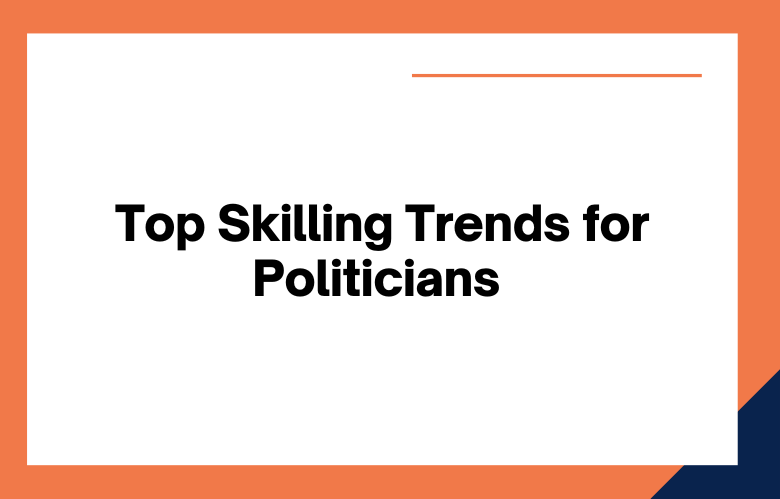It is more significant than ever for politicians to be adaptable and have a wide range of skills. Politics constantly shifts with technology, globalization, and the 24-hour news cycle. The top abilities politicians will need to stay relevant in 2025 and beyond.
Top Skilling Trends for Politicians in 2025
In 2025, political leaders are expected to strengthen skills beyond traditional public speaking and governance. The focus has shifted toward digital literacy, data-driven decision-making, cyber security awareness, and AI adoption to keep pace with fast-changing technology. Emotional intelligence, storytelling, and cultural competence remain vital for connecting with diverse communities, while crisis management, negotiation, and collaboration skills ensure effective leadership in complex environments. Politicians must also embrace continuous learning and global best practices to stay relevant and future-ready.
Digital Literacy and Technology Adoption
Politicians in 2025 must demonstrate strong digital literacy. Social media, online forums, and digital town halls have become primary channels of communication with citizens. Leaders who understand digital platforms can control narratives, counter misinformation, and strengthen voter engagement. Additionally, learning to use artificial intelligence for campaign management, sentiment analysis, and decision support has become a core requirement rather than an optional skill.
Data-Driven Decision-Making
Campaigns and governance increasingly rely on data analytics. Politicians need the ability to interpret voter demographics, behavioral trends, and polling results to design strategies and policies that resonate with the public. Data literacy allows leaders to move beyond intuition and base decisions on measurable evidence, improving both campaign performance and governance outcomes.
Cyber Security Awareness
With the rise of digital campaigning and online governance tools, cyber threats have become more frequent. Politicians must learn how to protect personal accounts, campaign infrastructure, and sensitive information from hacking and phishing attempts. Awareness training, secure communication protocols, and staff preparedness are essential to reduce vulnerabilities that can damage credibility or disrupt campaigns.
Emotional Intelligence and Public Trust
Building trust with voters requires more than policy knowledge. Emotional intelligence helps leaders connect with people, manage stress, and resolve conflicts. By improving self-awareness, empathy, and communication, politicians can better handle criticism, negotiate effectively, and maintain credibility even in challenging circumstances.
Storytelling and Communication Skills
Clear, authentic communication remains a central skill. Politicians must craft narratives that explain policies in relatable ways and highlight their vision for society. Storytelling strengthens public connection and increases message retention, particularly in media-saturated environments where attention spans are short.
Crisis Management Skills
Unexpected events such as natural disasters, security breaches, or economic shocks require rapid, well-structured responses. Politicians must know how to respond to crises with accurate information, decisive action, and transparent communication. Training in scenario planning and crisis simulations ensures readiness when real challenges arise.
Negotiation and Collaboration
Political progress often requires compromise and cooperation across party lines, government bodies, and civic organizations. Negotiation skills allow leaders to build consensus without sacrificing core principles. Collaboration ensures effective policy-making and prevents governance from stagnating due to conflict or division.
Cultural Competence and Inclusivity
In diverse societies, leaders must understand cultural differences and respect community traditions. Cultural competence ensures inclusive policymaking, prevents alienation, and improves communication with minority groups. Politicians who actively practice inclusivity gain broader legitimacy and foster unity in governance.
Leadership and Strategic Thinking
Strong leadership skills remain central to political effectiveness. Politicians in 2025 must provide direction, make ethical decisions, and maintain accountability in public life. Strategic thinking enables leaders to balance short-term political needs with long-term policy goals, ensuring decisions create lasting public benefit.
Tech literacy
Politicians need to be tech-literate. This means being able to use new technologies and understanding how they can be used to reach and engage constituents. As we become more reliant on technology, those uncomfortable using it will be disadvantaged.
Social media savvy
Social media platforms like Twitter and Facebook have completely changed how information is shared and accessed. Not media-savvy social politicians will miss critical opportunities to connect with voters.
Songwriter –
With the 24-hour news cycle, politicians are more pressured than ever to communicate effectively in writing. Whether it’s drafting speeches or policy briefs, those who can share their ideas clearly and concisely will be at an advantage.
Good public speaker
Along with being strong writers, it is also essential for politicians to be good public speakers. This skill goes hand-in-hand with being able to engage constituents and build trust. Being a good public speaker can also help to build credibility with voters.
Critical thinker
To make informed decisions, politicians need to be critical thinkers. This means assessing complicated issues from multiple perspectives and making sound judgments based on evidence. With the increasing complexity of political problems, this skill will become even more critical in the years ahead.
Team player
Although politics is often seen as a cutthroat industry, it is still essential for politicians to be team players. This skill becomes especially important when working on legislation or dealing with complex issues requiring multiple stakeholders’ input. Those who collaborate effectively will be better equipped to do things logically and efficiently.
Robotics and Automation
Robotics and automation are revolutionizing every industry, and politics is no different. As political campaigns become increasingly reliant on technology, those who can skillfully utilize robotics and automation will have a clear advantage. From campaign management software to donor management platforms, there is a myriad of ways that robotics and automation can help politicians run more efficient and effective campaigns.
Data Analytics
In an age where big data is king, those who know how to analyze data effectively will have a distinct political advantage. From understanding voting patterns to predicting election outcomes, data analytics is a valuable tool that can give politicians a leg up on their competition.
Social Media Marketing
In the past, traditional forms of marketing like television ads and print ads were the most effective way to reach voters. However, in today’s digital age, social media marketing is the tool at a politician’s disposal. Politicians can reach a wider audience and raise their profile by effectively understanding how to use social media platforms like Twitter and Facebook.
Fundraising Strategies
Fundraising is another essential part of any successful political campaign. As we head into 2025, it will be necessary for politicians to have a robust understanding of both traditional and digital fundraising strategies. This includes everything from hosting events to setting up online donation pages.
Many options are available when raising money for a political campaign, so politicians must be well-versed.
To run a successful political campaign, fundraising is essential. Politicians skilled at fundraising can tap into various sources, from small donors to large corporations. Additionally, those adept at fundraising will be better equipped to navigate the ever-changing landscape of campaign finance laws.
Social Media Management
As we head into 2025, politicians must understand how to use social media platforms like Facebook, Twitter, and Instagram to their advantage. This means posting engaging content and being responsive to comments and questions.
Public Speaking
Public speaking is another critical skill for politicians. Politicians need to be able to give speeches that inspire and motivate people to vote for them or support their policies. Additionally, they need to be able to handle difficult questions from reporters and constituents.
Writing
Writing is another essential skill for politicians. In addition to giving speeches, politicians must be able to write press releases, op-eds, and other materials to help promote their campaigns or policies. They also need to be able to write legislation and work with staff members on policy briefs and other documents.
Media Relations
Media relations is another critical skill for politicians. To find the message out to the public, politicians need to be able to work with journalists and pitch stories that will interest the media. Additionally, they need to be able to handle difficult questions from reporters and manage their public image.
Strategic Planning
Strategic planning is another essential skill for politicians. To run a successful campaign or govern effectively, politicians need to be able to set goals and develop strategies for achieving those goals. They also need to be able to assess risks and opportunities and make decisions based on data.
Listening skills
In a fast-paced, 24-hour news cycle world, it is more important than ever for politicians to have strong listening skills. With social media, constituents can reach out to their representatives anytime and expect a prompt response. Politicians must be able to listen to their members and understand their concerns to represent them effectively.
Communication skills
With the rise of social media, communication skills have become increasingly important for politicians. Politicians can communicate effectively to connect with constituents and get their message out there.
Negotiation skills
In today’s political climate, negotiation skills are more critical than ever. With so much partisan gridlock, politicians must be able to find common ground and compromise to get things done.
Marketing skills
To get elected, politicians must be able to market themselves effectively. This includes knowing how to craft a strong message that will resonate with voters and getting that message out through various channels such as television, radio, and social media.
Social media skills
Social media has been a powerful tool for politicians in recent years. Politicians must proficiently use various social media channels like Facebook, Twitter, and Instagram to connect with constituents and get their message out.
Research skills
With the vast amount of online information, research skills are essential for politicians who want to stay up-to-date on the issues. Politicians must be able to sift through all the information and find the most relevant and reliable sources to make informed decisions.
Debate
Debate is another critical skill for politicians. To be successful in debates, politicians must be able to think on their feet and articulate their positions clearly and persuasively. Additionally, debate skills can be handy when negotiating with other politicians or persuading people to vote for a particular candidate or issue.
Campaigning
Campaigning is another essential skill for politicians. Politicians who are effective campaigners will be better equipped to win elections. Campaigning involves various activities, such as canvassing, door-to-door campaigning, and holding events such as rallies and town halls.
Networking
Networking is another essential skill for politicians. Politicians with an extensive network of contacts will be better positioned to advance their careers and achieve their goals. Networking can help politicians meet potential donors, access essential resources, and build relationships with other influential people.
Debate Prep
In our current political climate, debates have become increasingly important. Politicians must be able to prepare for discussions to communicate their positions on the issues effectively. They must also be aware of their opponent’s positions and be designed to refute them.
Message Development
A compelling political message is critical to winning elections. Politicians must develop messages that resonate with voters and convince them to support their candidacy. They also need to be able to craft their message so that it can be communicated across various platforms, including television, radio, and social media.
Grassroots Organizing
Grassroots organizing is essential for any politician who wants to win an election. Politicians need to build support among voters at the grassroots level so that they can get out of the vote on election day. This involves activities such as door-to-door canvassing and phone banking.
Policy Development
Politicians must deeply understand the policy to develop practical solutions to our country’s problems. They also can work with members of both parties so that they can find common ground and pass legislation that will benefit the people.
Constituent Services
Providing excellent constituent services will be crucial for politicians in 2025. With the increasing demands of constituents, politicians must effectively manage their time and resources to meet the needs of those they represent.
Policy Development
Developing a policy responsive to constituents’ needs will be essential for politicians in 2025. Politicians need to stay current on the issues with the ever-changing landscape of politics.
Communications
Being an effective communicator will be vital for politicians in 2025. With the rise of new technology, politicians will need to be able to communicate effectively through different channels, including social media, email, and traditional news outlets.
Media Relations
Positive relationships with media members will be necessary for politicians in 2025. As the media continues to play a significant role in politics, politicians need to be able to work with media members to get their message out there.
Coalition Building coalitions with other elected officials are often necessary to get things done in politics. In 2025, coalition building will continue to be essential for politicians who want to get their agenda items passed into law.
Campaign Strategy
A successful political campaign requires a well-thought-out strategy. Politicians will need to be skilled in planning and organizing a campaign, as well as knowing how to allocate resources to maximize its chances of success. Additionally, they must know the latest marketing and advertising techniques to reach potential voters effectively.
Event Planning
Political campaigns often involve many events, such as rallies, town hall meetings, and fundraisers. Politicians must be skilled in event planning to ensure these events run smoothly and successfully achieve their objectives. This involves booking venues, catering, organizing transportation, and managing security.
Negotiation
Negotiation skills will continue to be critical for politicians in 2025 as they try to navigate the complex world of politics. Politicians will need to be able to negotiate with other elected officials, interest groups, and even members of their party to get things done.
Strategic thinking
Strategic thinking is another critical skill for politicians. Politicians need to be able to think long-term and develop strategies that will help them achieve their goals.
Time Management
Time management skills are essential for politicians, who often have a demanding schedule. Politicians must be able to prioritize tasks, manage their time effectively, and delegate responsibilities to get everything done promptly.
Conclusion
As we head into 2025, politicians must know essential skilling trends.
These skills will be essential for running a successful political campaign, from social media management to fundraising strategies.
Data analysis is another area that will be increasingly important for politicians in the coming years.
As we move into the age of big data, those who can collect and interpret data will have a significant advantage when making informed decisions about their campaigns.
In conclusion, the future of politics lies in the ability to adapt quickly and learn new skills.
As technology changes and society progresses, so too must our elected officials.
Those who can skillfully navigate these waters will be the most successful in 2025 and beyond.
If you’re a politician looking to stay ahead of the curve, Politician Management Consulting can help. We offer various services designed to help politicians remain on top.
Contact us today to learn more about how our expert team can help you succeed in 2025 and beyond.
Call: +91 9848321284
Email: [email protected]
Top Skilling Trends for Politicians in 2025: FAQs
What Are the Top Skilling Trends for Politicians Today?
Key trends include digital communication, data literacy, emotional intelligence, crisis management, and AI adoption.
Why Is Continuous Learning Important for Politicians?
Continuous learning helps politicians stay relevant, adapt to changing voter expectations, and address emerging challenges.
How Important Is Digital Literacy for Political Leaders?
Digital literacy is critical for engaging voters online, managing social media, and countering misinformation.
What Role Does Data Literacy Play in Modern Politics?
Politicians must understand data to make evidence-based decisions, analyze voter behavior, and craft targeted policies.
How Can Politicians Improve Their Public Speaking Skills?
Through media training, practice with storytelling techniques, and learning to adapt messages for diverse audiences.
Why Should Politicians Develop Emotional Intelligence?
Emotional intelligence enhances empathy, conflict resolution, and trust-building with constituents.
How Are Politicians Using AI and Technology Skills?
They use AI for sentiment analysis, campaign automation, voter engagement, and predictive governance models.
What Negotiation Skills Are Essential for Politicians?
Key skills include active listening, compromise, framing win-win solutions, and managing stakeholder expectations.
How Important Is Media Training for Politicians?
Media training equips leaders to handle interviews, debates, and press conferences confidently and effectively.
What Leadership Skills Should Politicians Focus On?
Skills include vision-setting, ethical decision-making, delegation, and motivating teams under pressure.
How Can Politicians Strengthen Crisis Management Skills?
By preparing response protocols, practicing simulations, and learning transparent communication strategies.
Why Is Cultural Competence a Key Skill for Politicians?
It enables leaders to connect with diverse communities, respect traditions, and frame inclusive policies.
What Role Does Strategic Thinking Play in Political Success?
It helps leaders anticipate challenges, plan long-term policies, and align short-term actions with broader goals.
How Important Is Collaboration in Politics?
Collaboration with colleagues, civil society, and global leaders improves governance and consensus-building.
What Financial Management Skills Should Politicians Learn?
Budgeting, understanding fiscal policy, and resource allocation skills are crucial for public accountability.
How Can Politicians Improve Their Cyber Security Awareness?
By learning secure communication practices, strong authentication methods, and staff training for digital safety.
What Role Does Storytelling Play in Political Communication?
Storytelling makes policies relatable, inspires trust, and engages citizens emotionally.
Why Should Politicians Focus on Social Media Skills?
Social media skills help leaders connect directly with citizens, share updates, and counter misinformation effectively.
How Can Politicians Learn From Global Skilling Trends?
By adopting best practices in governance, attending international training, and applying modern leadership frameworks locally.
What Future Skills Will Politicians Need?
Future skills include AI ethics, sustainability leadership, cross-border diplomacy, and digital governance expertise.










